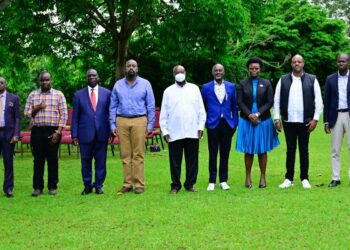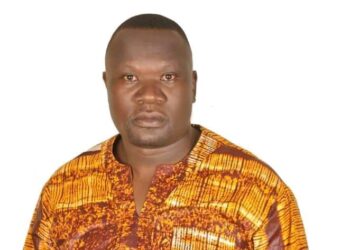As Uganda’s ruling party, the National Resistance Movement (NRM), prepares for its internal primary elections set to commence on 17th July 2025, a new directive from the NRM Electoral Commission has stirred the waters of political debate within party circles. The commission, under the stewardship of Dr. Tanga Odoi, resolved that all aspiring candidates must hold joint campaign meetings in the spirit of fostering unity and cohesion within the party ranks.
On paper, the idea is noble and aligns with the party’s long-held values of solidarity and internal discipline. After all, the NRM prides itself as a mass party with deep grassroots support, whose strength lies in collective mobilization and coordinated messaging. Joint campaigns, according to Dr. Tanga, will promote internal democracy and allow voters to assess candidates equally without undue advantage.
However, as the proverb goes, “Even a well-tied bundle can fall apart.” This directive has revealed fault lines within the party, and many aspirants, especially those with legitimate concerns are questioning its practicality and fairness. The idea of joint campaigning has been met with mixed reactions from the candidates and the electorate, some viewing it as a noble call for unity, while others see it as a potential mask for deeper internal rot and dysfunction.
In many constituencies, political dynamics are far from harmonious. Some incumbent Members of Parliament have reportedly done little to justify their re-election, and their presence on joint campaign platforms only serves to highlight their lack of performance.
These individuals often attempt to compensate for poor service delivery with deep pockets, showering voters with money and material gifts. As the saying goes, “Empty drums make the loudest noise,” and some are hoping that wealth will drown out their inefficiencies.
Conversely, there are determined and visionary aspirants who have remained rooted in their constituencies, engaging with voters, initiating community projects, and preparing themselves diligently for leadership. These are candidates who have built organic, ground-level support based on trust and service. Forcing such individuals to campaign jointly with political opportunists and absentee leaders is seen by many as unfair and potentially damaging to the credibility of the entire process.
Uganda is no stranger to internal party discord during electoral seasons. In past primaries, the NRM has witnessed chaotic scenes ranging from violence, vote rigging, bribery, and intimidation. In some cases, the fallout from disputed primaries has led to independent candidates splitting the vote and weakening the party’s performance in general elections. For example, in the 2021 elections, several constituencies experienced post-primary defections, costing NRM seats that should have been easy wins.
Joint campaigns, rather than promoting peace, risk becoming stages for public humiliation, especially where tensions are already high. Picture a platform where a candidate with a track record of absenteeism or corruption stands next to a grassroots mobilizer with community endorsement, such a scenario may not only inflame divisions but also expose the party to ridicule. Voters are not blind; they know who served them and who didn’t.
Beyond Uganda, lessons abound. In South Africa, the African National Congress (ANC) has faced serious internal divisions, with joint campaign efforts often turning into battlegrounds of ideological and personal conflicts. Similarly, Kenya’s Jubilee Party suffered internal splits before the 2022 general elections, despite early attempts to promote party harmony. These examples show that imposed unity without internal healing only masks problems temporarily.
Additionally, the culture of “team politics”, locally known as ‘egali’ has taken root in NRM circles too, where candidates form cliques that seek to discredit, sabotage, or outright attack rivals within the party. The logic of joint campaigns falls apart when such factions exist. Political maturity is not just about speaking from the same platform, it is about respecting divergent opinions and letting the voters hear individual merit without intimidation or manipulation.
We must also reflect on the essence of democracy, which is giving voters the freedom to choose their leaders based on ideas, track record, and vision, not coercion, camouflage, or forced pairings. As one African proverb warns, “You cannot hide smoke when there is fire.” Joint campaigns may attempt to create an image of harmony, but they cannot conceal the deep frustrations on the ground.
Therefore, as a patriotic member of NRM, I respectfully suggest that the party revisits these campaign guidelines. Let candidates be allowed to roll out their campaigns independently, so that voters can evaluate each one objectively and without coercion. It is in these moments of transparent engagement that true democracy flourishes.
Let us also remember: “A house divided against itself cannot stand.” NRM’s legacy must not be one of silencing healthy competition but of building a stronger, more credible party where merit, service, and integrity are rewarded. The upcoming primaries are not just a test of loyalty, they are a test of leadership and direction for the future of the party and the country.
May reason prevail over routine, and may unity come not by force but by shared vision and purpose. The true strength of the NRM lies not in managed optics, but in authentic grassroots trust.
Phillip R. Ongadia – NRM Mobilizer, NRM Publicity Secretary Church Cell –Walukuba East and PRO Jinja social Media Team.
Do you have a story in your community or an opinion to share with us: Email us at editorial@watchdoguganda.com














